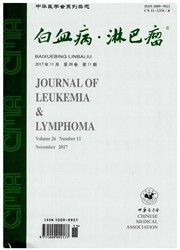

 中文摘要:
中文摘要:
目的研究急性淋巴细胞白血病(ALL)患者的染色体异常核型及其与临床特征和近期疗效的关系。方法采用骨髓细胞短期培养法、吉姆萨显带对110例ALL患者进行染色体核型分析。结果110例ALL患者中,正常核型71例(64.5%),异常核型39例(35.5%),染色体核型结构异常者24例(21.8%),数目异常者11例(10.0%),结构及数目异常者3例(2.7%),异常复杂核型1例。伴有t(9;22)(q34;q11)的ALL患者疗效差于其他患者(确切概率法,P=0.045),伴有t(9;22)(q34;q11)的成年人ALL与儿童ALL疗效差异无统计学意义(确切概率法,P=0.506)。结论ALL患者的染色体核型异常具有随机性,较常见的有t(9;22)(q34;q11)、t(4;11)(q21;q23),其疗效较差。
 英文摘要:
英文摘要:
Objective To investigate the chromosome karyotype of acute lymphocytic leukemia (ALL) and its correlation with the clinical feature and efficacy. Methods The chromosomes of bone marrow/ peripheral blood from 110 cases of patients with ALL were prepared after 24 hours culture, and G-banding were used to analyze karyotypes. Results Among 110 patients with ALL, 71 cases (64.5 %) had clonal chromsomal normalities, 39 cases (35.5 %) had elonal chromsomal abnormalities, 24 cases (21.8 %) had chromosome structural abnon~lalities, 11 cases (10.0 %) had chromosome number abnormalities, 3 cases (2.7 %) had chromosome number and structure abnormalities, one case had chromosomal abnormalities complex karyotype. Efficacy in patients with ALL with t(9;22) (q34;qll) was worse than the other patients (Fisher" s exact text, P = 0.045). There was no significant difference on efficacy between in adult ALL associated with t(9;22) (q34;qll) and in children with ALL (Fisher's exact text, P = 0.506). Conclusion Chromosome karyotype of ALL patients is random, chromosomal translocations such as t(9;22)(q34;qll) and t(4;11) (q21;q23) have poorer treatment outcomes.
 同期刊论文项目
同期刊论文项目
 同项目期刊论文
同项目期刊论文
 Treatment with cyclophosphamide, vindesine, cytarabine, dexamethasone, and bleomycin in patients wit
Treatment with cyclophosphamide, vindesine, cytarabine, dexamethasone, and bleomycin in patients wit 期刊信息
期刊信息
